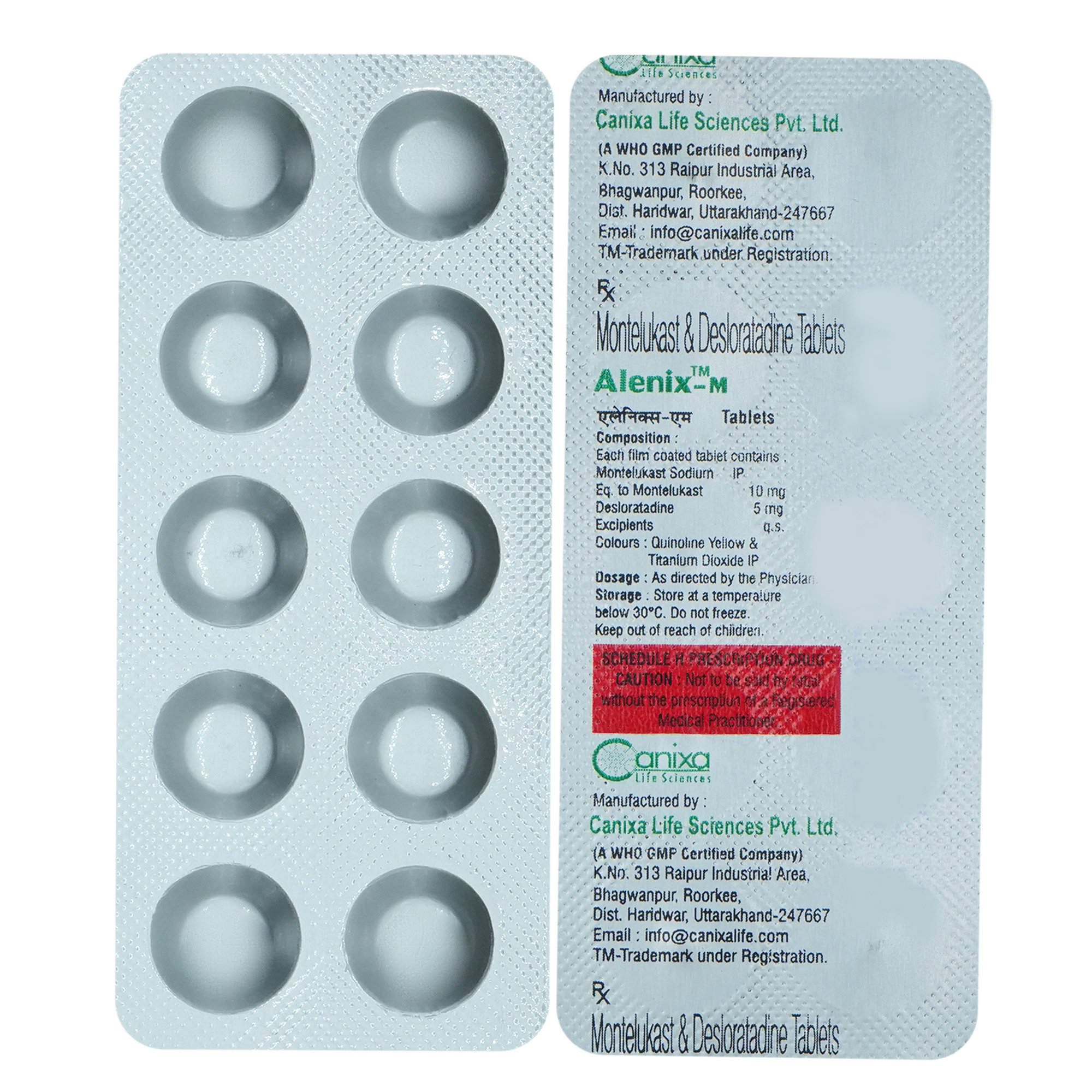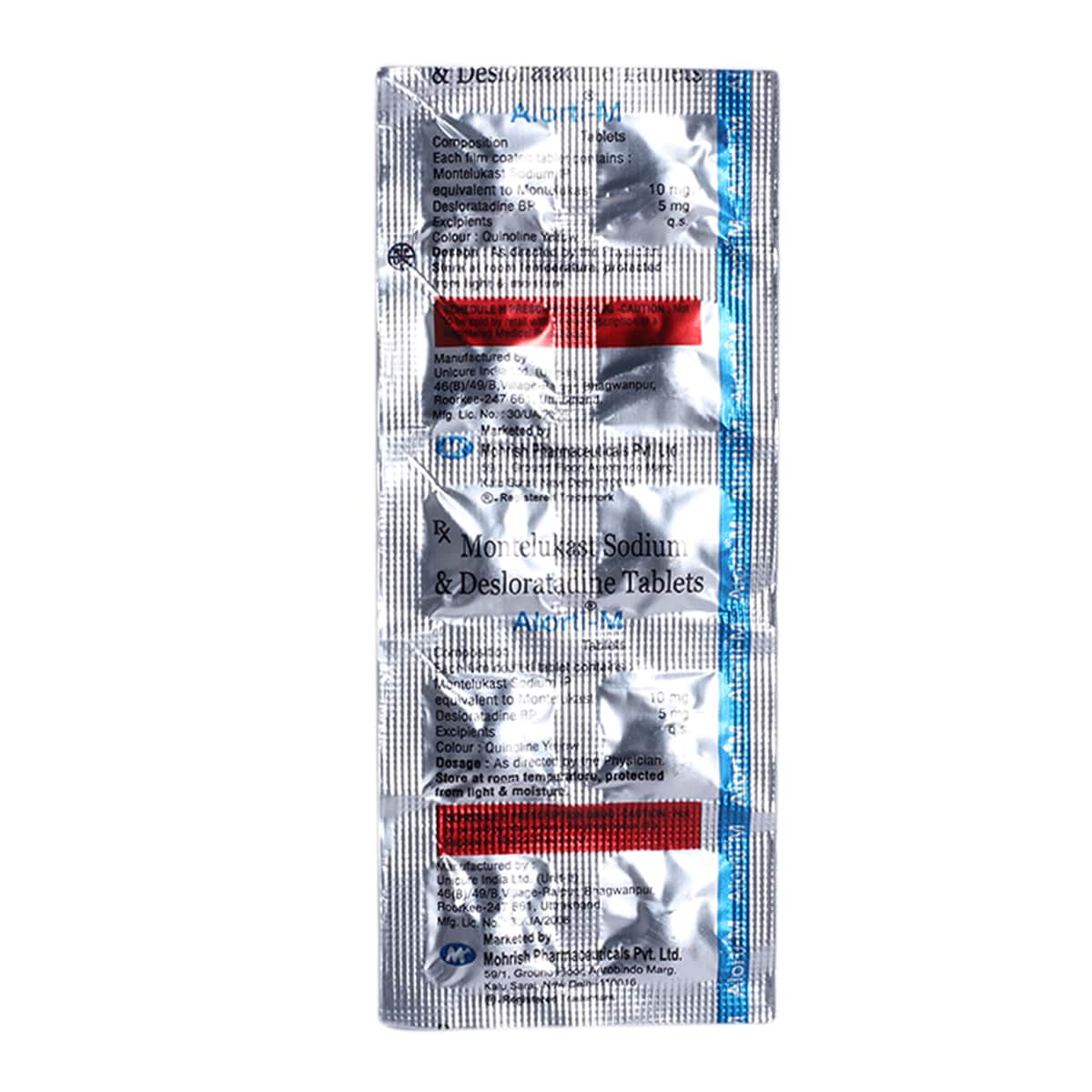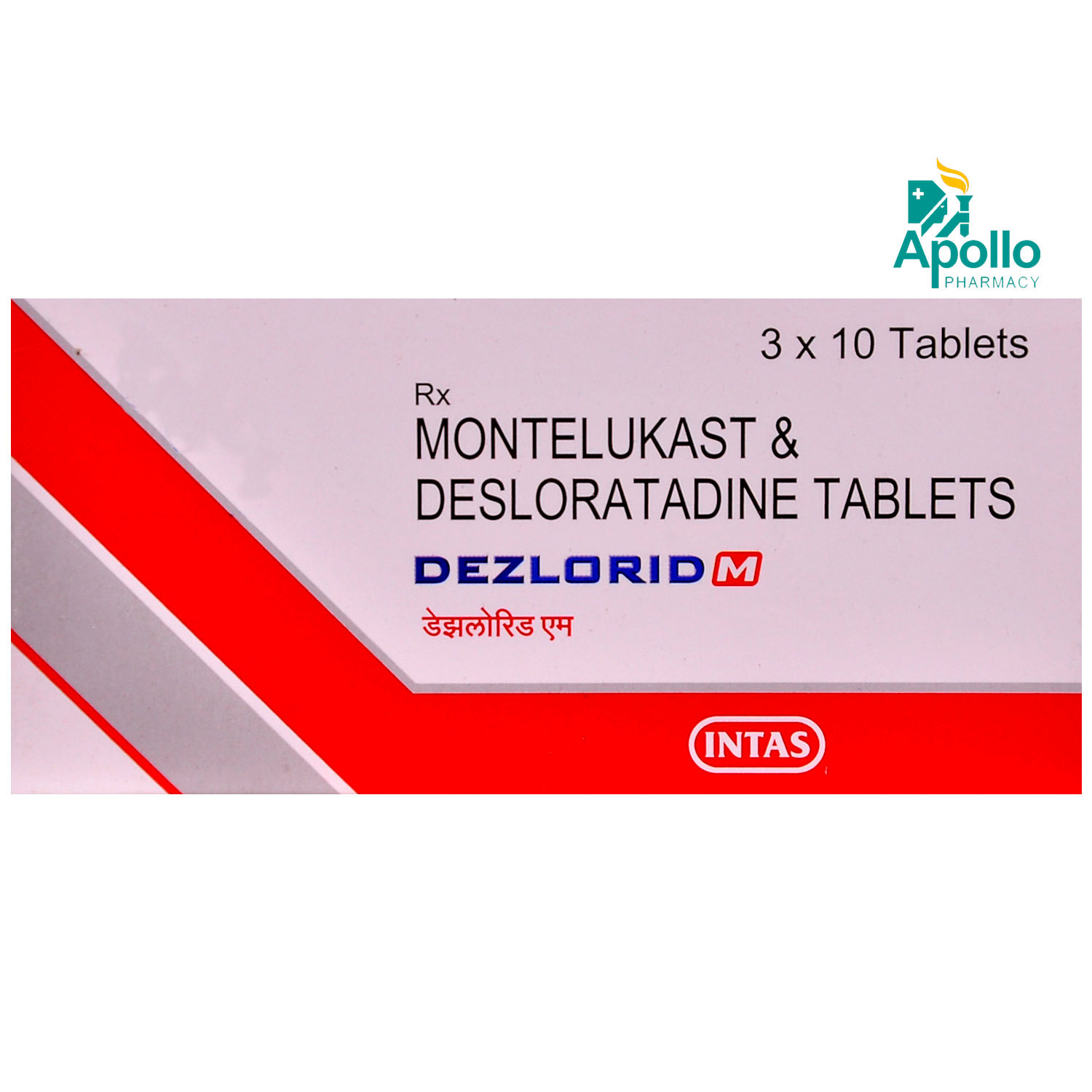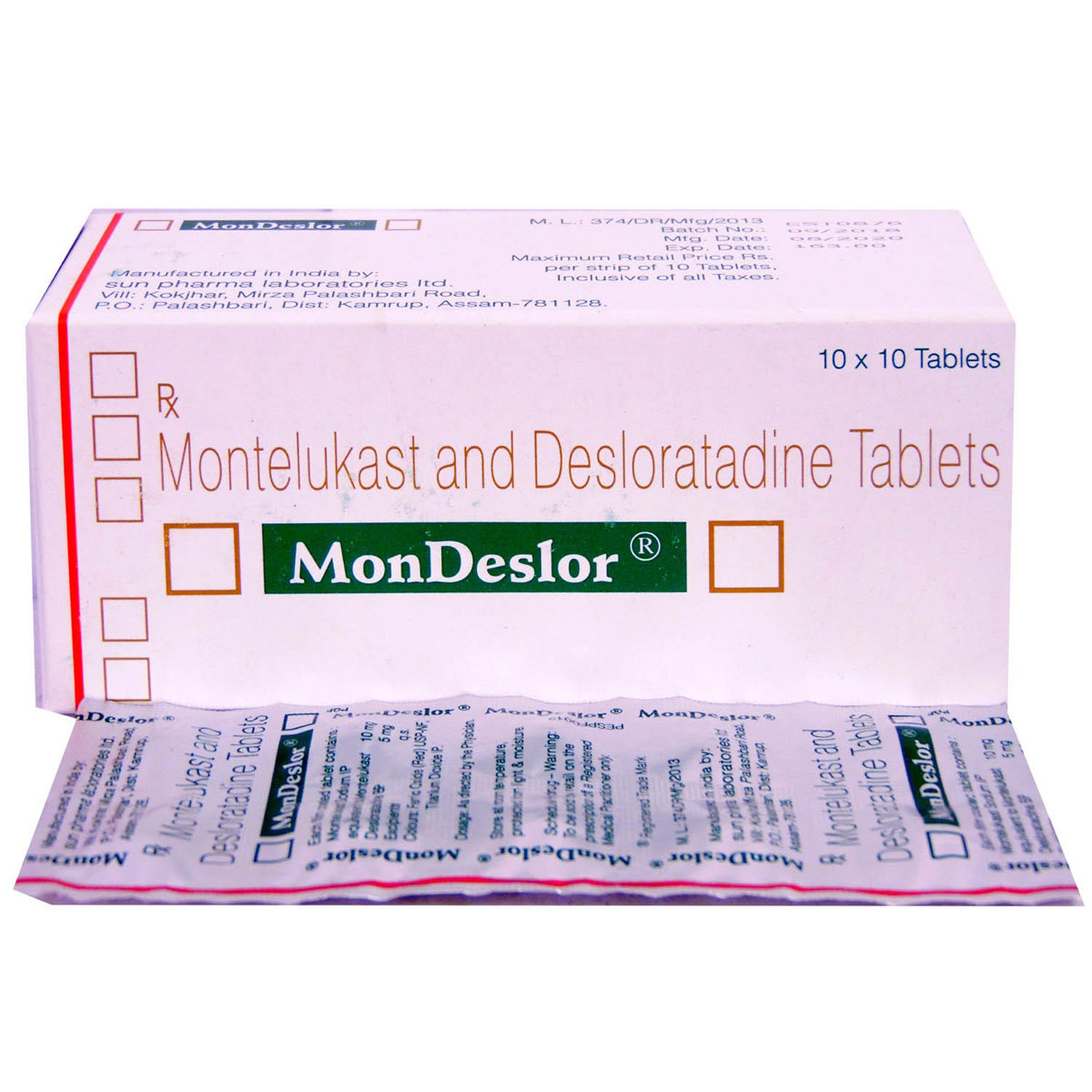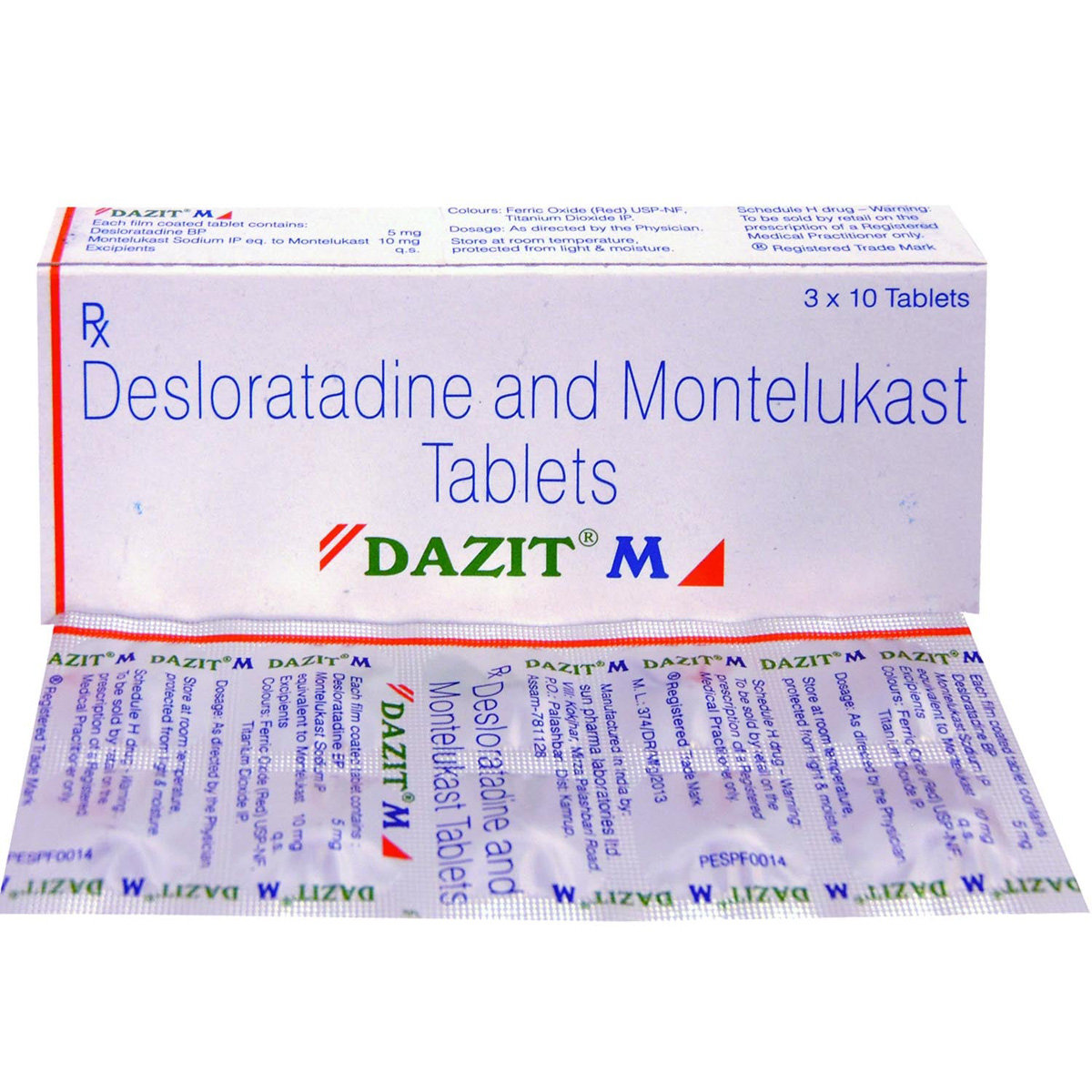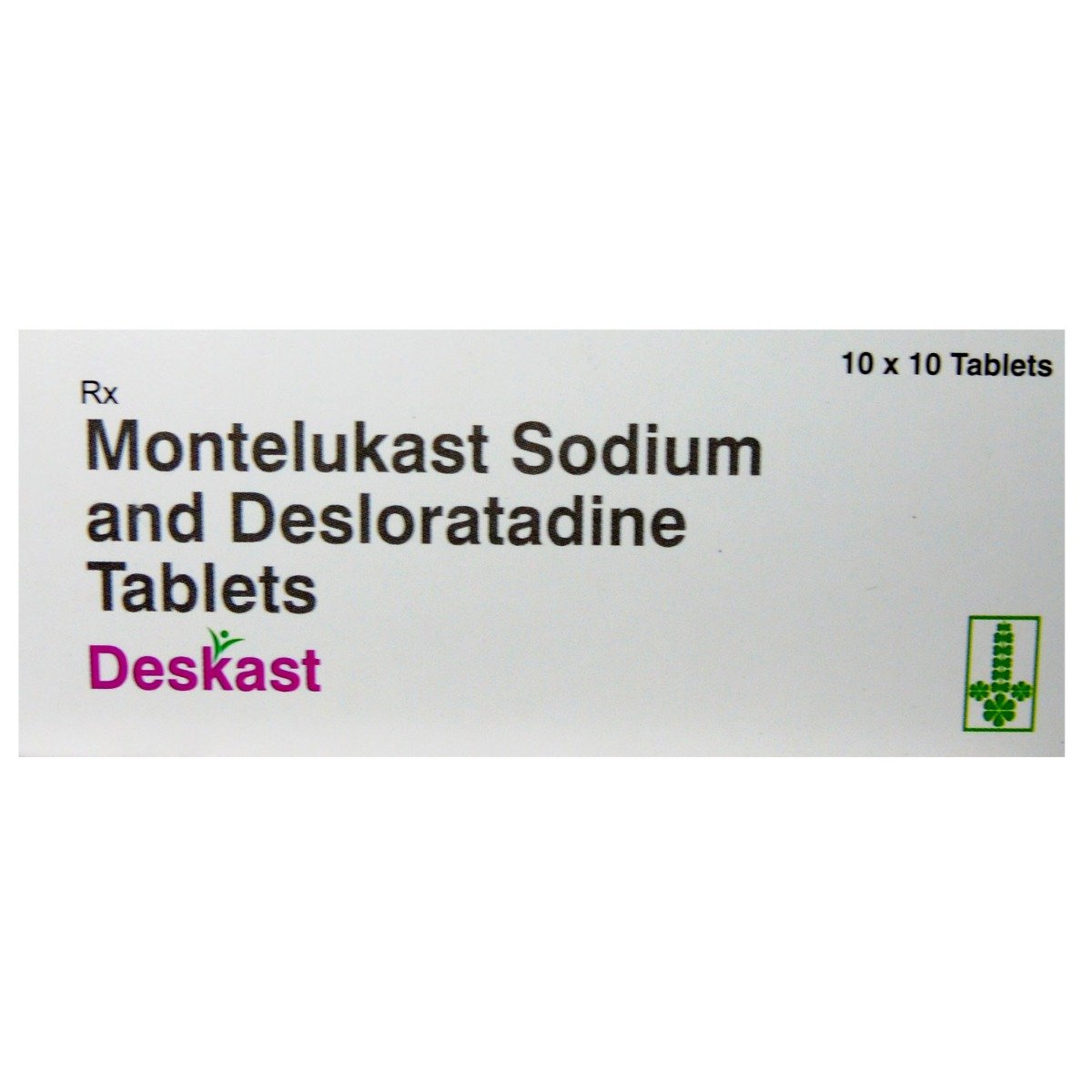Montisoor D Tablet 15's
MRP ₹200
(Inclusive of all Taxes)
₹30.0 Cashback (15%)
Provide Delivery Location
Online payment accepted
 Prescription drug
Prescription drugWhats That
Composition :
Manufacturer/Marketer :
Consume Type :
Expires on or after :
Return Policy :
About Montisoor D Tablet
Montisoor D Tablet belongs to the class of medications ‘antiallergic’ used in the treatment of allergic rhinitis. Allergic rhinitis (hay fever) is an allergic response to certain foods or pollen, pet dander, or other allergens. Allergic condition varies from person to person. It is typically characterized by allergic symptoms such as a runny nose, sneezing, red, watery, itchy, and swollen eyes.
Montisoor D Tablet is a combination of two medicines: Desloratadine and Montelukast. Desloratadine is an antihistamine and acts by blocking histamine's action (chemicals causing allergic symptoms) and reducing the allergic reaction. It provides quick relief from allergic symptoms. Montelukast is a leukotriene antagonist, which blocks a chemical messenger (leukotriene) and reduces inflammation and swelling in the nose.
You should take this medicine as prescribed by your doctor. The common side-effects of Montisoor D Tablet are abdominal pain, headache, fatigue, and dry mouth. These side-effects usually go away without any medical treatment. However, if any of these side-effects persist or worsen, consult a doctor immediately.
Do not take Montisoor D Tablet if you are allergic to Desloratadine, Montelukast, or any other ingredients present in it. Before taking Montisoor D Tablet , inform your doctor about all the allergies you have, if any. Montisoor D Tablet is not recommended in patients who have medical or family history of seizures, kidney failure, and phenylketonuria (an inherited disease that causes a build-up of amino acid phenylalanine in the body). Montisoor D Tablet is not recommended for use in children under 12 years of age. Inform your doctor if you are pregnant or breastfeeding.
Uses of Montisoor D Tablet
Directions for Use
Key Benefits
Montisoor D Tablet is a combination of two medicines: Desloratadine and Montelukast. Desloratadine is an antihistamine and acts by blocking histamine's action (chemicals causing allergic symptoms) and reducing the allergic reaction. It provides quick relief from allergic symptoms. Montelukast is a leukotriene antagonist, which blocks a chemical messenger (leukotriene) and reduces inflammation and swelling in the nose. Together, Montisoor D Tablet improves allergic symptoms such as sneezing, runny nose, coughing, watery eyes, etc.
Storage
- Hydrate your body: Drink enough water to prevent dehydration and headaches.
- Calm Your Mind: Deep breathing and meditation can help you relax and relieve stress.
- Rest and Recharge: Sleep for 7-8 hours to reduce headache triggers.
- Take rest: lie down in a quiet, dark environment.
- Cold or warm compresses can help reduce tension.
- Stay Upright: Maintain good posture to keep symptoms from getting worse.
- To treat headaches naturally, try acupuncture or massage therapy.
- Over-the-counter pain relievers include acetaminophen and ibuprofen.
- Prescription Assistance: Speak with your doctor about more substantial drug alternatives.
- Severe Headaches: Seek emergency medical assistance for sudden, severe headaches.
- Frequent Headaches: If you get reoccurring headaches, consult your doctor.
- Headaches with Symptoms: Seek medical attention if your headaches include fever, disorientation, or weakness.
- Inform your doctor immediately if you experience a fever after starting a new medication.
- Your doctor may adjust your medication regimen or dosage as needed to minimize fever symptoms.
- Monitor your body temperature to monitor fever progression.
- Drink plenty of fluids, such as water or electrolyte-rich beverages, to help your body regulate temperature.
- Get plenty of rest and engage in relaxation techniques, such as deep breathing or meditation, to help manage fever symptoms.
- Under the guidance of your doctor, consider taking medication, such as acetaminophen or ibuprofen, to help reduce fever.
- If your fever is extremely high (over 103°F), or if you experience severe symptoms such as confusion, seizures, or difficulty breathing, seek immediate medical attention.
- Manage stress by practising deep breathing, yoga or meditation.
- Get enough sleep. Maintain a regular sleep cycle.
- Exercise regularly. Try physical activities like walking, running, or dancing.
- Limit stimulants like tea, coffee and alcohol.
- Identify triggers and try managing them.
- Take a break by scheduling time for yourself.
- Try creative activities like writing, dancing or painting as it helps release tension.
- Inform your doctor about the symptoms you're experiencing due to medication.
- Your doctor may adjust your treatment plan, which could include changing your medication, adding new medications, or offering advice on managing your symptoms.
- Practice good hygiene, including frequent handwashing, avoiding close contact with others, and avoiding sharing utensils or personal items.
- Stay hydrated by drinking plenty of fluids to help loosen and clear mucus from your nose, throat, and airways.
- Get plenty of rest and engage in stress-reducing activities to help your body recover. If your symptoms don't subside or worsen, consult your doctor for further guidance.
- Tell your doctor about the cough symptoms you're experiencing, which may be triggered by your medication.
- Your doctor may adjust your treatment plan by changing your medication, adding new medications, or providing guidance on managing your cough symptoms.
- Practice good hygiene, including frequent handwashing, avoiding close contact with others, and avoiding sharing utensils or personal items.
- Stay hydrated by drinking plenty of fluids, such as water, tea, or soup, to help thin out mucus and soothe your throat.
- Get plenty of rest and engage in stress-reducing activities to help your body recover. If your cough persists or worsens, consult your doctor for further guidance.
- Inform your doctor about dizziness symptoms. They may adjust your medication regimen or prescribe additional medications to manage symptoms.
- Follow your doctor's instructions for taking medication, and take it at the same time every day to minimize dizziness.
- When standing up, do so slowly and carefully to avoid sudden dizziness.
- Avoid making sudden movements, such as turning or bending quickly, which can exacerbate dizziness.
- Drink plenty of water throughout the day to stay hydrated and help alleviate dizziness symptoms.
- If you're feeling dizzy, sit or lie down and rest until the dizziness passes.
- Track when dizziness occurs and any factors that may trigger it, and share this information with your doctor to help manage symptoms.
Drug Warnings
If you notice any behavioral changes while taking Montisoor D Tablet , inform your doctor immediately. If you are supposed to undergo skin testing, the doctor might advise you to stop taking Montisoor D Tablet 72 hours before the test as it decreases response to skin prick test. Do not stop taking Montisoor D Tablet abruptly even if you feel better, as it may cause withdrawal symptoms such as itching, burning sensations, or runny nose.
Drug-Drug Interactions
Drug-Drug Interactions
Login/Sign Up
Co-administration of Montisoor D Tablet with Isocarboxazid can increase the risk of CNS depression.
How to manage the interaction:
Taking Montisoor D Tablet with Isocarboxazid together can possibly result in an interaction, but it can be taken if a doctor has advised it. Do not stop using any medications without talking to a doctor.
Co-administration of Ivacaftor and Montisoor D Tablet can increase the levels of Montisoor D Tablet.
How to manage the interaction:
Co-administration of Montisoor D Tablet with Ivacaftor can possibly result in an interaction, but it can be taken if doctor has advised it. Do not stop using any medications without talking to a doctor.
Co-administration of Montisoor D Tablet with Tranylcypromine may increase the risk or severity of CNS depression (decreased heart rate, decreased rate of breathing, loss of consciousness).
How to manage the interaction:
Although there is an interaction between Montisoor D Tablet with tranylcypromine, but it can be taken if a doctor has advised it. However, if you experience any unusual symptoms contact your doctor immediately. Do not discontinue any medications without consulting a doctor.
Coadministration of Rifapentine with Montisoor D Tablet may reduce the blood levels and effects of Montisoor D Tablet. This can lead to low treatment outcomes.
How to manage the interaction:
Taking Rifapentine with Montisoor D Tablet together can possibly result in an interaction, it can be taken if your doctor has advised it. If you experience increased side effects such as headache, fever, sore throat, cough, abdominal pain, diarrhea, earaches, runny nose, or behavior and mood changes consult a doctor. Do not discontinue any medications without consulting a doctor.
Coadministration of Miconazole with Montisoor D Tablet may increase the blood levels and effects of Montisoor D Tablet. This increases the risk or severity of side effects.
How to manage the interaction:
Although there is a possible interaction between miconazole and Montisoor D Tablet, you can take these medicines together if prescribed by your doctor. However, if you experience any symptoms such as fever, sore throat, cough, stomach pain, diarrhea, earache, runny nose, or uncommon, depression, confusion, difficulty concentrating, anxiety, hallucinations, irritability. memory impairment, restlessness, sleep walking, Consult a doctor immediately. Do not stop using medications without a doctor's advice.
Coadministration of Montisoor D Tablet and Phenytoin may reduce the blood levels and effects of Montisoor D Tablet. This can lead to low treatment outcomes.
How to manage the interaction:
Taking Montisoor D Tablet and Phenytoin may interact with one another, but they can be taken together if your doctor has prescribed them. However, if you experience signs such as headache, fever, sore throat, cough, abdominal pain, diarrhoea, earache, runny nose, or behaviour and mood changes, consult a doctor immediately. Do not discontinue any medications without consulting a doctor.
Coadministration of Montisoor D Tablet and primidone can reduce the levels and effects of Montisoor D Tablet.
How to manage the interaction:
Taking Montisoor D Tablet and Primidone together can possibly result in an interaction, it can be taken if prescribed by a doctor. However, if you experience any unusual symptoms, contact a doctor immediately. Do not discontinue any medications without consulting a doctor.
Coadministration of Montisoor D Tablet and rifabutin can reduce the levels and effects of Rifabutin. This can lead to low treatment outcomes.
How to manage the interaction:
Taking Montisoor D Tablet and rifabutin together can possibly result in an interaction, it can be taken if your doctor has advised it. However, if you experience increased side effects such as headache, fever, sore throat, cough, abdominal pain, diarrhea, earache, runny nose, or behavior and mood changes consult a doctor. Do not discontinue any medications without consulting a doctor.
Drug-Food Interactions
Drug-Food Interactions
Login/Sign Up
Diet & Lifestyle Advise
- Stay hydrated as it is vital for those with a cough or cold. Drinking liquids at room temperature can alleviate runny nose and sneezing.
- Avoid stress as the immune system is affected by stress and raises the risk of being sick. An individual can exercise regularly, meditate, do deep breathing, and try progressive muscle relaxation techniques to relieve stress.
- Avoid contact with known allergens (allergy-causing agents) such as pollen, dust, etc., and also certain food items are known to cause allergies to you.
- Maintain personal hygiene and keep your surroundings clean.
Side Effects of Montisoor D Tablet
- Abdominal pain
- Headache
- Fatigue
- Dry mouth
- Diarrhea
- Dizziness
- Drowsiness
- Nausea
- Vomition
- Fatigue
- Irritability
Habit Forming
Therapeutic Class
All Substitutes & Brand Comparisons
RX
Descure M Tablet 10's
Cure N Cure Pharmaceuticals Ltd
₹99
(₹8.91 per unit)
25% CHEAPERRX
Desmont Tablet 10's
Xemex Life Sciences
₹101.5
(₹9.14 per unit)
23% CHEAPERRX
Avertich-M Tablet 10's
Amwill Healthcare Pvt Ltd
₹107.5
(₹9.68 per unit)
19% CHEAPER
Drug-Diseases Interactions
Drug-Diseases Interactions
Login/Sign Up
FAQs
Drug-Drug Interactions Checker List
- PHENOBARBITAL
- PHENYTOIN
- FLUOXETINE
- CIMETIDINE
- KETOCONAZOLE
- AZITHROMYCIN
- ERYTHROMYCIN
- RIFAMPICIN
- GEMFIBROZIL
- ASPIRIN
Special Advise
- Stop taking Montisoor D Tablet and inform your doctor or the person before undergoing any tests.
Disease/Condition Glossary
Allergic rhinitis: It is also called hay fever. It occurs when the immune system responds to foreign elements that are typically not harmful to your body. These foreign elements are known as ‘allergens’ and examples may include pollen, pet dander, and dust mites, etc. Symptoms include itching, watery eyes, swelling around the eyes, runny nose, and sneezing. It is usually identified by performing a skin prick test and allergen-specific immunoglobulin (IgE) antibody test.

Have a query?
Alcohol
Safe if prescribed
Alcohol consumption may worsen your health condition and also interfere with the activity of Montisoor D Tablet . So, do not consume alcohol while taking Montisoor D Tablet .
Pregnancy
Consult your doctor
Montisoor D Tablet is a category C medicine. It may cause toxic effects to the fetus. So, it should be used in pregnant women only if needed by doing a benefit/risk assessment.
Breast Feeding
Consult your doctor
Montisoor D Tablet can be safely used in breastfeeding mothers when prescribed.
Driving
Safe if prescribed
Montisoor D Tablet may cause drowsiness. So, do not drive or operate heavy machinery if you feel sleepy.
Liver
Consult your doctor
Montisoor D Tablet should be used with caution in patients with liver diseases. The dose may have to be adjusted by your doctor.
Kidney
Consult your doctor
Montisoor D Tablet should be used with caution in patients with kidney diseases. The dose may have to be adjusted by your doctor.
Children
Safe if prescribed
Montisoor D Tablet is not recommended for use in children under 12 years of age.




